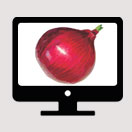
Online Satire and Journalism: An Interview with Larry Pryor
Larry Pryor directs the Online Program at the University of Southern California's Annenberg School for Communication, where he is on the Journalism School faculty and is executive editor of the Online Journalism Review. He was formerly a reporter for The Louisville Courier-Journal and, later, for the Los Angeles Times. He held various writing and editing positions at the LA Times, including news editor of Times Mirror's pioneering videotex project, Gateway, in 1982 and editor of the LA Times' Web site in 1996.
CHECK PLEASE!: Let me begin by asking you about the history of the Online Journalism Review.
LARRY PRYOR: We started in 1998, and our goal at that time was to be some kind of "truth squad" for the Internet; I know it was an ambitious mission. It had some assumptions -- that there wasn't enough regulation, you know the clichÈ -- "The sheriff hadn't arrived in town yet" -- and so we thought that was our duty. And we put up a very pretentious mission statement.
CP!: I do recall that.
PRYOR: Yes, you and I had words about it last year. And we were serious about that, but you have to start somewhere. In the meantime, of course, the medium has been growing more than exponentially and changing in fundamental ways; new audiences come on. Back in the mid 90s, it was largely still a white male, early-adopter kind of audience. Pornography was the top traffic magnet; things were still pretty primitive.
Forums came up, and then developed into rant and flaming territory.
Remember all those difficult years -- there were a lot of problems dealing with privacy, there were a lot of problems dealing with commercialization of sites -- sites which you couldn't tell if they were news or some lipstick company hiding as news -- it was very weird. So we had plenty to write about. But over time things have changed so drastically that we have had to shuck many of our mission concepts and go with the flow of the new media and its more relaxed rules.
CP!: So you'd say the Web is a bit more mature now than when you started?
PRYOR: I think it's a lot more mature -- I think it's fundamentally different actually.
CP!: There are certainly not a lot of sites that have been around for that span of time.
PRYOR: And those that have survived have changed substantially -- look at AOL. And then we've got Google and Yahoo and Amazon and Ebay -- these are entities that have understood what's going on and have adapted to the dynamics of the Internet and its audience.
CP!: So how would you evaluate the general status of online news outlets at this point versus other media?
PRYOR: It's a very mixed scene, I think. Some sites are obviously laudable and are making a big effort to be credible and provide good information and are enormously valuable -- the obvious ones would be, in this country, The New York Times, The Washington Post, The Wall Street Journal, Sign On San Diego, maybe SF Gate.
And there are regional sites -- like the Minneapolis Star-Tribune, sites abroad like the BBC -- that have interesting applications and are experimenting with multimedia, are getting into blogs, and are trying to understand how the medium works.
But that's one side of the coin. The other is pretty dismal. For the most part, it's a fairly dismal scene because most news organizations have been really reluctant to invest in their websites, and it shows.
CP!: Most of the credible sources you cite have a major offline presence as well.
PRYOR: Right. So they're able to leverage their success as news organizations in this new medium and do it very well. They could be doing better -- with the exception of the BBC I don't think they've gotten where they should. I would include MSNBC in this mix -- I think that most news organizations don't understand the opportunity here and how important it is for them to get involved. They're missing a huge opportunity and it could be extremely costly.
CP!: That leads into my next question, which is about failures in critical thinking. I think there are two issues here: first, the failure of a news organization to recognize what they have, and then there's the failure of individuals to appreciate the actual plausibility of a story which they may receive via email or a usenet group or a forum. In fact there's an article on Wired.com, "Onion Taken Seriously: Film At Eleven," that describes how an Onion story was reprinted in the Beijing Evening News; it goes on to give a good half-dozen examples of similar events. I'm not surprised at the failure of individuals to recognize these so much as I am at the news outlets. To what extent do you think that's a question of not devoting adequate time and resources -- and that includes intellectual resources --
PRYOR: Sure.
CP!: -- to what extent is that sloppy journalism?
PRYOR: I think it's institutional. I think it's the same problem we see today with the 9/11 Commission as it looks at the way the FBI behaves. These news organizations have attitudes that are so embedded in them, so endemic to the way they operate, and those attitudes are not only fortified but well-protected by senior level editors and publishers who resist change and still think that this "Internet thing" is crazy. You hear comments like "It's going to go the way the CB radio did" -- totally out of touch with reality.
CP!: So it doesn't matter because it's not important. And what about the headline aggregators: They are working to present themselves as credible news sources, but there is no filtering of these.
PRYOR: That's true.
CP!: I don't know if you've noticed, but Google News accepts satire sites as sources -- they label them as such, but it was an interesting decision to us [satire sites]. What do you make of Google's decision to do this?
PRYOR: I think it's smart. I think that we have to experiment. This medium is just getting going -- I think it's a huge mistake to make firm policies and rules and codes of behavior and journalistic ethics that may or may not be applicable to this medium. I tend to be a libertarian when it comes to the Internet -- you always worry about whether people are smart enough to understand this is satire, or that that is some loony radical, but that's the nature of the medium. If you are on the Internet the rule is caveat emptor, you're supposed to be a mature, discerning citizen and know what you're looking at, or at least be skeptical of what you're looking at, and if people can't play by those rules maybe they should stay away. I hope that didn't sound snobbish, but you have to understand that what works in print and broadcast does not work here.
CP!: And that opens up many more opportunities for satire sites.
PRYOR: Oh yeah -- and also alternative sites; some of them are totally laughable to me, but they're fun to go to.
CP!: It's my impression that there are many more sites, both legitimate and satire news sites, today than there were even a year ago.
PRYOR: Definitely.
CP!: And they've been gaining some form of attention --
PRYOR: Well the technology, for one thing, allows them to present themselves in a much more authentic way. The sites that do the spoofs on Bush's aircraft carrier speech, for example -- they photoshop the picture so it's got the banner saying "I was AWOL" and the patches on his flight suit that say "Exxon" and "Shell" -- stuff like that is just wonderful. Now we're off into some of the best of political satire. And it's Photoshop and its ease of use that allows you to do that.
CP!: So I take it satire's not dead.
PRYOR: No -- you're in the right field!
CP!: I noticed that OJR analyzed The Onion's post-9/11 coverage; there were a number of commentaries on humor and satire following that event. Has that changed the dialogue?
PRYOR: I think what The Onion did was important. It established some truths: that you could exercise satire in the most gruesome and delicate of times -- but it wasn't just the Internet. I think the close attention paid to the late-night show intros and SNL was also there -- and email as a conveyance of jokes and satire preceded the Web. So I'm not sure there's been a big change since 9/11.
CP!: Would you say there's been a post 9/11 reaction? For a while things were relatively subdued.
PRYOR: Quite rightly.
CP!: There was a lot of discussion about whether the nature of humor or irony as a valid medium for commentary had been altered.
PRYOR: I think there are all sorts of complicated things going on. For one thing, I think the media, all the media, are going through a real self-examination as a result of the excesses we saw on cable television during the Iraq war. For a while there, even the White House communications director said you had to watch what you say. There was kind of a fear I believe -- also at that time Bush had 80 percent favorable ratings -- we were really in an all-out war mode; and that is not conducive to satire, or criticism, or mature examination of what's going on. I think a lot of people were just scared.
But as the reality of the Middle East has played out, I think news organizations have gotten a lot more spine. And the Internet, the 9/11 Internet, has become more of the "truth squad" that we envisioned ourselves being back in 1998 -- the Internet audience has collectively become the major critic of the news media. And that's a wonderful thing -- it's shaped the press up in fundamental ways, and it's providing feedback into the major media. Things that are unearthed by blogs that may get only 20,000 readers a day end up actually influencing millions of people because it gets filtered back through the mainstream media.
CP!: Well let me ask you about The Onion, the definitive online satire source. This article in Wired pretty much focuses on it -- and we are all compared to it at one point. To what extent do you think The Onion has defined satire online, or do you think it's a convenient example for mainstream media to focus on?
PRYOR: I think it's convenient -- it's obvious, and it got there first; it's done a good job. But I don't look to The Onion, frankly, as the fount of good humor or satire anymore. I think there are many sites like yours that are proliferating, and blogs are becoming great sources of responses and quick retort and marvelous sources of satire, especially graphics.
CP!: That leads me to another difference between online and offline sources: I wonder if this contributes to the effectiveness of the Internet as a critic of mainstream media. You can call the media on errors or inconsistencies made over time -- it's a lot easier to find out what CNN was saying in August 2002 online than via video. It becomes a reference source.
PRYOR: I agree. I think the searchability is key to this, particularly because it allows us to leave the countries of origin and get alternative viewpoints. To me it's extremely valuable to read papers in India reporting on the Iraq war, not least because their journalists can wander the streets while the American reporters are holed up in a hotel. This gives the Internet surfers a huge advantage over people who are getting their news via broadcast or print. And there's no question of that -- but I'm not as critical of the aggregators as I think you are. I think they have a long way to go, and no one would like to see them improve their algorithms more than I would, but I think they're wonderful. Where else could you get up to date information on Sunday afternoon? I found the Aug. 6th memo [about Al Qaida's threat to the U.S.] five minutes after it had been released on Google News.
CP!: I think Google News is atypical. There are others that present everything but there is some sorting. I don't know if you've noticed, but it's very rare for a satire site to make the GN front page. It will show up in the news alerts, though.
PRYOR: Well we don't show up on the front page either. And sometimes we have some extremely important pieces that could really help people understand some aspect of media. In addition, if we don't put the writer's name in the text of the story, it's not searched -- so our writers are saying, "We don't want bylines, we want to be in the body of the text."
CP!: Search engines are changing the way stories are written, then.
PRYOR: Ha ha, yes.
CP!: One of the last things I'd like to ask you is about satirical commentary and political ideology. One of the things that surprised me when I joined this community of satire sites is the fact that it's not oriented on political lines. The common profession of satirical commentary seems to transcend the political differences. I was wondering to what extent that's a broader function of the Internet -- I suspect it's not isolated to this community.
PRYOR: I have a slightly different take on it; I think the bigger piece of the equation is "What are young people doing?" And I think that young people traditionally have favored humor -- when I was at Stanford I wrote for the humor magazine -- I think today young people are finding humor on the Internet. I think you're seeing people between eight and 28 are multitasking and are getting a lot more of their information from humor sites and cable --
CP!: Jon Stewart, for example.
PRYOR: Yeah. And that's great: better that than no information at all. And I think this is going to have an impact on how they approach media. They have expectations that humor is going to be more readily available and serves as a valid form of input. I think this is not new, but the Internet is providing a new resource that allows people to access topical satire and humor, and to participate in it, more readily.
CP!: So it's a demographic issue more than a political one.
PRYOR: Yes. I don't think the online audience of the mid 1990s was a terribly humorous group -- they were quite conservative, white middle-aged engineers. That dynamic has completely changed -- I think the medium is being heavily youth-driven to a degree we don't understand and are having trouble measuring.
CP!: It's difficult to get reliable stats of any kind.
PRYOR: Yes -- this is basically a young medium which we don't understand. We're really flying totally blind. I find that quite exciting, but at the same time it's a little unnerving.
CP!: So where do you see online journalism in ten years?
PRYOR: Ha!
CP!: Get out your crystal ball...
PRYOR: Well I have to confess a bias on this, because I am working with the engineering school at USC and I am quite enamored with VR technology; and I really love 3-D presentations.
CP!: Are you working with the Institute for Creative Technologies [at USC]?
PRYOR: Not directly -- I am working with the Integrated Media Systems Center. They are developing incredible immersive technology. My feeling is, why can't we apply this to news? Why can't we have 3-D news environments? Some of this is already being done -- some of the games coming out now are depicting wartime reality from only a few months ago. So why can't we bring it up to a point where VR depicts the world of yesterday, or today?
CP!: And then we'll have to come up with satirical versions.
PRYOR: That's the virtue of this: You could use your mouse and say, "I want the real world, and now I want the liberal democratic world, now flip me over to the satire version."
CP!: That would be great. I can see some of the guys laying out plans already.
PRYOR: It's all a matter of money. Once you've got the setup, it's a function of ingenuity.
CP!: That could be a limiting factor. Money is not something that most small sites are awash in.
PRYOR: You're going to need partners. I'm partnering now with an engineering school -- I've got a 360 degree camera, for example, that cost the school around $120,000, and they let me use it. If you work with non-profits it's possible.
Overall I think you're well positioned. I think satire is a staple of the Internet, and the demographics are going to drive it more.
CP!: Well thank you again for taking the time to speak with me today.
PRYOR: My pleasure.




